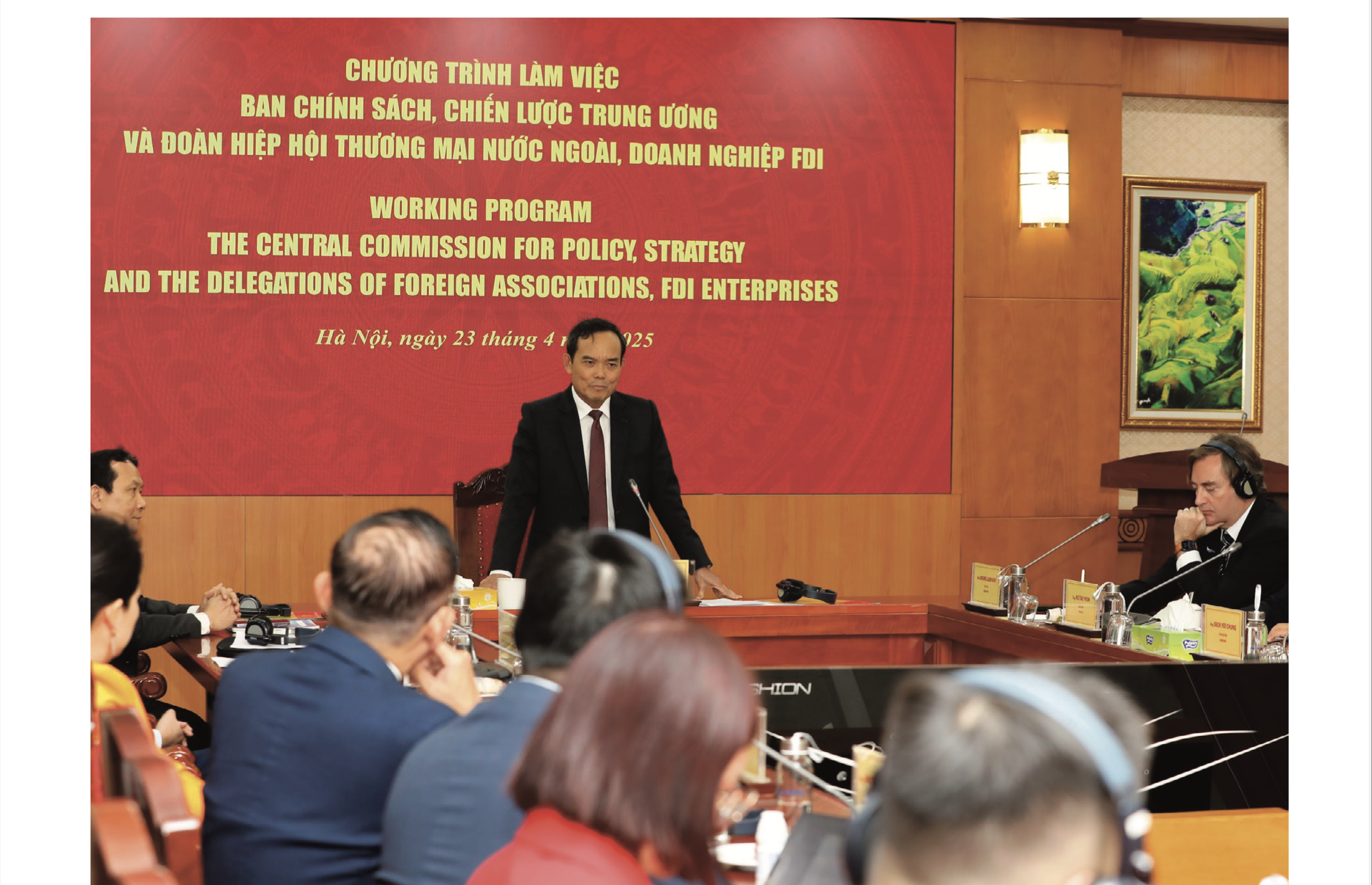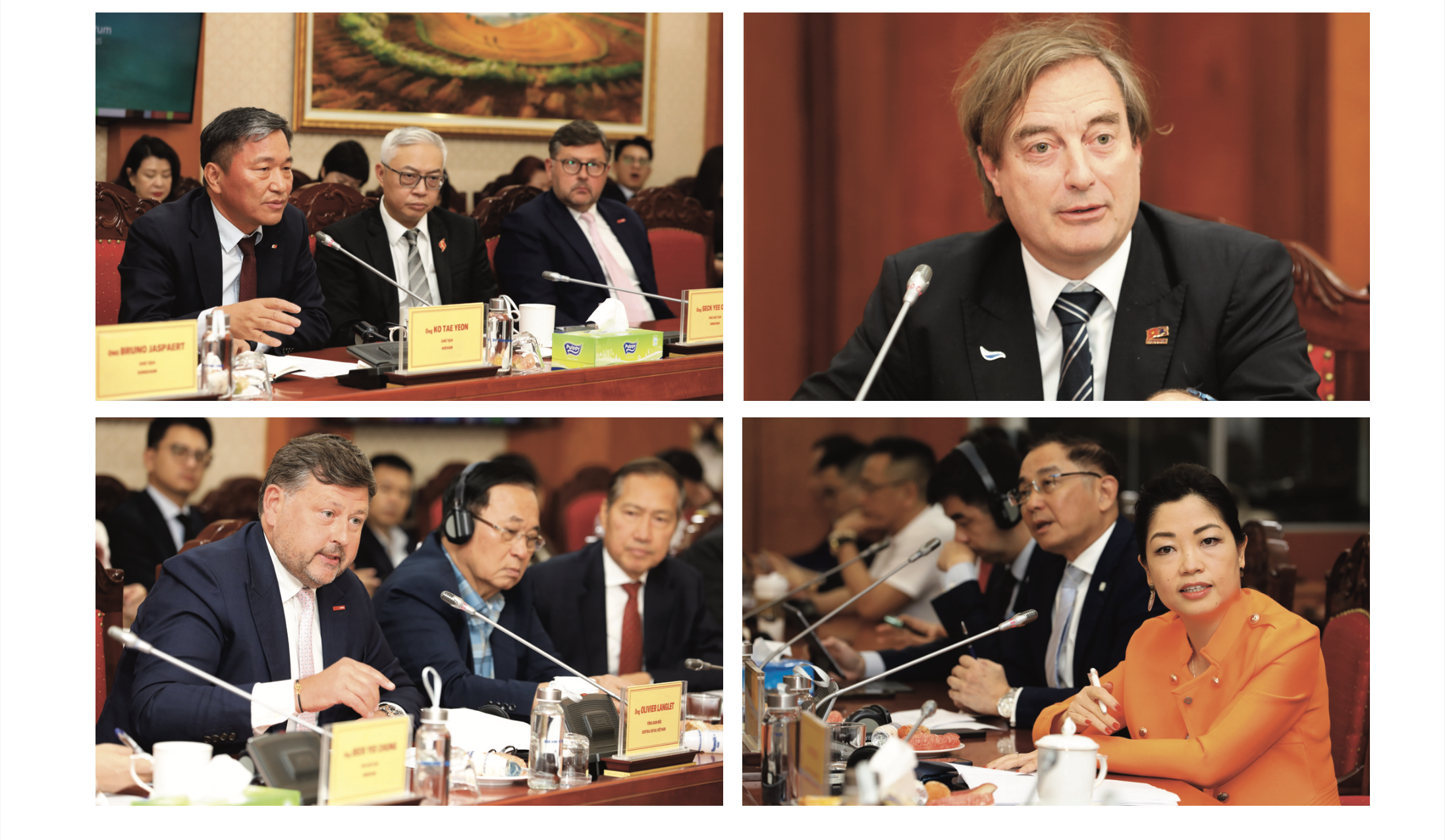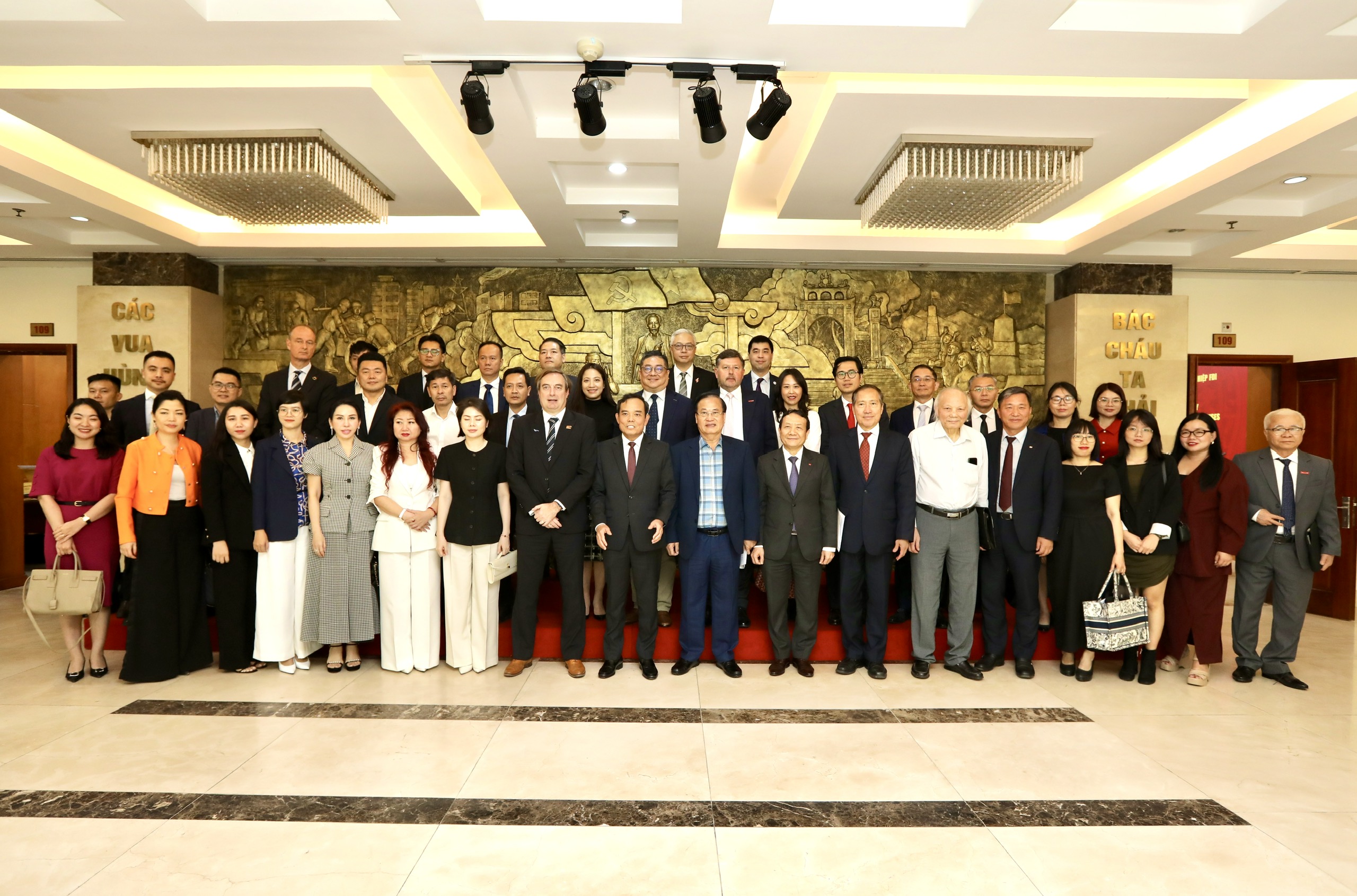
On April 23, Mr. Tran Luu Quang, Secretary of the Party Central Committee and Chairman of the Party Central Committee's Commission for Policy, Strategy, held a working session with leaders of foreign business associations and executives from leading corporations, foreign-invested enterprises (FIEs), and foreign investors currently operating in Vietnam. The session was part of the Vietnam Connect Forum 2025, jointly organized in Hanoi by the Institute for Policy and Strategy at the Party Central Committee's Commission for Policy, Strategy, in collaboration with Vietnam Economic Times / VnEconomy / Tap chi Kinh te Viet Nam, under the Vietnam Economic Association.
During the session, representatives from the business community commended the consistent efforts of the Communist Party of Vietnam and the Vietnamese Government in fostering a conducive investment environment and attracting FDI. Business leaders also engaged in candid discussions, sharing the challenges they continue to face in doing business in the country.
Seeking clearer investment pathways
Key concerns raised during the session included issues related to the regulatory framework, administrative procedures, legal provisions, and the lack of sufficient and synchronized infrastructure. Furthermore, the persistent shortage of skilled workers, particularly high-quality human resources, was identified as a pressing constraint. Additionally, representatives from FIEs also touched on how the US’s reciprocal tariffs will impact supply chains and the export performance of enterprises across several key sectors.
They put forward practical proposals and recommendations aimed at strengthening collaboration between Vietnam and the investment community. Those suggestions focused on identifying timely and effective solutions to address existing obstacles and support sustainable business operations moving forward.
According to figures from the Foreign Investment Agency, as of the end of 2024, South Korea remained Vietnam’s largest foreign investor, with 10,128 projects and total registered capital exceeding $92 billion, or 24.11 per cent and 18.22 per cent, respectively.
Amid the current global economic landscape, Mr. Ko Tae Yeon, Chairman of the Korean Business Association in Vietnam (KoCham), noted that many FIEs are re-evaluating Vietnam’s competitiveness as a top investment destination. “Companies are shifting their strategies from focusing solely on efficiency to prioritizing diversification,” he emphasized. This approach not only aims to mitigate risks but also reflects a broader structural transformation across industries.
He expressed a wish for more concrete policies to support research and development (R&D), including R&D workforce training, tax incentives, and visa facilitation for foreign technical experts. In the logistics sector, he stressed the urgent need to upgrade infrastructure to reduce operational costs.
To address the labor market mismatch, KoCham recommends enhancing coordination between enterprises and vocational training centers, implementing tailored internship programs, providing scholarships, and improving living conditions such as dormitories. Financial assistance for exporting firms and deferred tax inspections would also be highly beneficial during this challenging period. “Most importantly, to resolve practical issues, we propose establishing a One-Stop Solution Center,” Mr. Ko said. “In parallel, we call for the creation of a formal dialogue mechanism between the government and the business sector to facilitate constructive feedback from FDI enterprises on policy changes.”
Among more than 100 countries and territories with newly-licensed investment projects in Vietnam in 2024, Singapore ranks as the largest investor with nearly $10.21 billion, accounting for 26.7 per cent of total capital. Mr. Seck Yee Chung, Vice President of the Singapore Chamber of Commerce in Vietnam (SingCham), warned that the proposed US tariffs are likely to disrupt critical supply chains for both businesses and US consumers, as Vietnam has emerged as a key manufacturing hub for major global players.
To sustain this position, Mr. Chung emphasized that Vietnam must continue to improve and reform administrative bodies, streamline procedures, and simplify the bureaucratic system. Furthermore, efforts should be made to foster a more open business environment and facilitate investment by minimizing or eliminating government approval requirements for FIEs.
Meanwhile, with $1.5 billion in investment in 2024 and a positive business outlook for 2025, the EU is poised to become a key source of FDI, particularly in sectors such as renewable energy, technology, and services. Mr. Bruno Jaspaert, Chairman of the European Chamber of Commerce in Vietnam (EuroCham), emphasized the importance for Vietnam of clearly defining its investment priorities over the next decade, whether to attract the highest volume of capital or the most value-added contributions to national development. “This decision is entirely in Vietnam’s hands,” he said. “It is critical that it clarifies its target investor profile and positions itself as a safe and reliable destination for strategic investment.”
Mr. Jaspaert also recommended that Vietnam consider offering incentives to investors producing goods domestically using 100 per cent locally-sourced materials, including tax benefits. Such measures would serve as powerful drivers in attracting more investors in the near future.
In addition, the EU-Vietnam Free Trade Agreement (EUVFTA) has helped elevate the EU to sixth place among Vietnam’s largest FDI sources and will continue to fuel the expansion of European business activities in Vietnam. Mr. Jaspaert stressed that beyond the EU, Vietnam should maximize the benefits of all its FTAs to enhance its competitiveness and attractiveness among international investors.

Voices from key industries
Retail remains one of the fastest-growing sectors in Vietnam, but businesses are encountering significant practical challenges. Mr. Olivier Langlet, Group CEO of Central Retail Vietnam, pointed out that navigating the legal framework, especially the Land Law, continues to pose considerable obstacles.
Given Central Retail’s long-term investment commitments in Vietnam, he proposed expediting and streamlining the retail licensing process. Under the current system, businesses are required to commit substantial resources prior to application and approval, creating heightened risks and uncertainty. He recommended allowing license applications to be submitted only after securing land use rights and construction permits, with parallel assessments conducted during project development.
Moreover, the limited availability of land for modern retail development presents another pressing issue. Mr. Langlet called for prioritizing and expanding land allocation for commercial and service purposes, enabling retail growth and stimulating broader economic activity. Ambiguities in new laws, such as the Land Law 2024, and fire safety regulations have also caused delays and investment instability. He emphasized the urgent need for clear, consistent guidance for local authorities to ensure uniform enforcement and foster investor confidence.
Mr. Michael Vu Nguyen, Country Director of Boeing Vietnam, highlighted several long-term measures to strengthen Vietnam’s aerospace ecosystem. These include workforce training, particularly in manufacturing, reduced import tariffs on aviation components, and stronger collaboration between FDI firms and domestic businesses.
Regarding US reciprocal tariffs, he suggested that Vietnam address the root cause of the tariffs: its trade imbalance. Vietnam Airlines is currently in the process of purchasing 50 Boeing aircraft, with a total value of around $11 billion. Meanwhile, Vietjet Air is working on a deal to purchase 200 Boeing planes. Several other aircraft contracts between the two countries’ partners are also under discussion.
Ms. Hoang Tri Mai, General Director of Airbus Vietnam, offered two recommendations for Vietnam. First, to institutionalize sustainable development and post-crisis resilience, invest in quality and sustainability rather than quantity, and develop a diversified supply base to help enterprises respond to crises and minimize disruption risks. Second, to invest in infrastructure tailored to the aviation sector’s specific needs, including stable energy sources, specialized logistics, multimodal transport, and green industrial parks. Airbus has been a longstanding partner of Vietnamese aviation. Approximately 200 Airbus aircraft are in operation by carriers such as Vietnam Airlines and Vietjet, representing 65 per cent of the domestic market share.
From a banking standpoint, Mr. Victor Ngo, CEO of UOB Vietnam, believes that amid the uncertainties and shifting world order, the immediate priority is to secure livelihoods by protecting jobs and to retain the existing supply chains and production capacities that Vietnam and FIEs have successfully built over the years.
He highlighted four key areas that are vital for supporting Vietnam’s transition to this new world order. First, the need for measures to support and retain workers in vulnerable industries, ensuring these sectors remain resilient during this period of change. Second, the importance of exploring and expanding new markets to unlock fresh opportunities for growth and diversification. Third, the necessity of incentivizing existing FIEs to continue their operations in Vietnam, leveraging their expertise and capital for further economic development. And lastly, investment in emerging growth sectors, including the development of Vietnamese brands and products, machinery and equipment, software, consumer electronics, and sustainability efforts such as environmental, social, and governance (ESG) practices.
With the support of the local government and business associations and with the entrepreneurial spirit of the Vietnamese people, Mr. Ngo expressed confidence that Vietnam would emerge stronger and more independent in the years ahead.
Among all sectors, the boom in e-commerce is significantly driving Vietnam’s digital economy. However, domestic e-commerce platforms such as Shopee, Lazada, and Tiki currently face higher compliance costs and more complex procedures than cross-border companies. With global trade facing disruptions, intra-regional integration and diversification of export markets are becoming more vital than ever.
Mr. Jason Bay, Country Director of Sea Limited, Shopee’s parent company, advocated for a more equitable legal framework. He said the forthcoming Law on E-Commerce should ensure a level playing field for all market participants. Cross-border e-commerce platforms and social networks with commercial functionalities must be held to the same standards as domestic e-commerce providers. The Ministry of Industry and Trade is currently drafting this new law, which is scheduled to be submitted to the National Assembly for consideration in October.
Across sectors, businesses are aligned in their call for Vietnam to accelerate infrastructure investments and upgrade human resources training, particularly for priority industries. There is also a growing emphasis on attracting investment into emerging sectors with transformative potential, such as AI, renewable energy, and logistics, all of which are reshaping global value chains.

Engaging with stakeholder feedback
After attentively listening to representatives from the foreign business community, Mr. Quang expressed his appreciation of their contributions to Vietnam’s growth agenda. Key proposals included more selective FDI attraction strategies, focusing on both project quality and investment partners, developing human capital through joint efforts, and encouraging innovation and digital transformation across enterprises. He reaffirmed the pivotal role of the FDI sector in Vietnam’s ongoing economic development.
Mr. Quang also responded directly to each concern raised by the FDI business community. For instance, regarding the retail sector, which he noted benefits from the natural advantage of Vietnam’s 100-million-strong consumer market and thus receives fewer incentives, he said the Party and the government are still actively facilitating administrative procedures. This includes potentially decentralizing land allocation authority to local levels, while encouraging businesses to expand local supply chains to gain cost advantages, provided quality control of input materials is maintained.
In response to businesses concerned about US reciprocal tariff on imports, Mr. Quang emphasized the importance of transparency in export data to the US to ensure accurate figures, while affirming that Vietnam is actively negotiating to secure the most favorable outcomes.
Concluding the working session, he outlined several priority tasks that Vietnam must focus on in the near future. First, comprehensive administrative reform; second, resolving overlaps in legal and institutional frameworks; third, expanding and improving infrastructure; fourth, enhancing human resources, especially high-quality talent, which he described as a critical bottleneck. This, he stressed, requires not only policy support from the government but also strong collaboration and commitment from businesses, treating this as a shared responsibility to ensure timely and quality workforce development aligned with emerging industry standards. And finally, addressing US reciprocal tariff measures, for which businesses need government support to navigate the challenge effectively.
“We have taken note of all your input to inform policy formulation, and I can affirm that Vietnam is embracing a new and more adaptive approach to governance,” he told session participants. “The government will continue to accompany and create favorable conditions for FDI enterprises in Vietnam.” He also emphasized that sustainable economic development must be a two-way endeavor. He called on FDI businesses to actively support domestic enterprises, through technology transfer and enabling deeper participation in global value chains, so that together they can build a more resilient and interconnected economic ecosystem.
"In 2024, the total value of newly-registered, additional, and contributed capital through equity purchases and stake acquisitions amounted to nearly $38.23 billion. Export turnover from the FDI sector (including crude oil) was estimated at close to $290.8 billion, a 12.2 per cent increase compared to 2023, contributing a remarkable 71.8 per cent of Vietnam’s total export value. The FDI sector also accounted for approximately 17 per cent of total social investment."
Mr. Tran Luu Quang, Secretary of the Party Central Committee and Chairman of the Party Central Committee's Commission for Policy, Strategy, reaffirmed the pivotal role of the FDI sector in Vietnam’s ongoing economic development.








 Google translate
Google translate